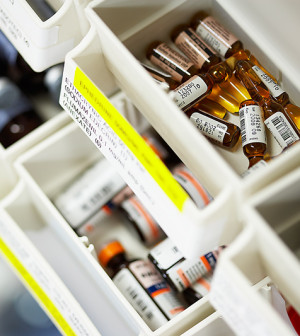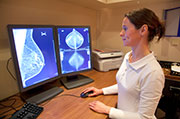- Double Mastectomy May Offer No Survival Benefit to Women With Breast Cancer
- Toxic Lead Found in Cinnamon Product, FDA Says
- Certain Abbott Blood Sugar Monitors May Give Incorrect Readings
- Athletes Can Expect High Ozone, Pollen Counts for Paris Olympics
- Fake Oxycontin Pills Widespread and Potentially Deadly: Report
- Shingles Vaccine Could Lower Dementia Risk
- Your Odds for Accidental Gun Death Rise Greatly in Certain States
- Kids From Poorer Families Less Likely to Survive Cancer
- Tough Workouts Won’t Trigger Cardiac Arrest in Folks With Long QT Syndrome
- At-Home Colon Cancer Test Can Save Lives
Radiation for Breast Cancer May Raise Heart Risks: Study


MONDAY, Oct. 28Radiation therapy for early stage breast cancer carries a small, but real, risk of heart disease, new research finds.
The lifetime risk ranges from 0.05 percent to 3.5 percent, depending on how the radiation was delivered and a woman’s overall risk for heart disease, the researchers report.
Women at greatest risk are the ones receiving radiation on their left breast while lying on their back and who also are at risk for heart disease.
Radiation of the left breast ups the risk since that also exposes the heart to radiation, the study authors explained.
The lowest risk is among women receiving radiation for their right breast while lying face down. When radiation is given on the right side, the heart is totally out of the field of radiation, they noted.
“Our findings confirm that the radiation exposure associated with left-breast cancer radiotherapy is associated with a generally small, increased risk of heart disease later in life,” said lead researcher David Brenner, a professor of radiation biophysics at Columbia University Medical Center, in New York City.
“Of course, that side effect needs to be balanced against the fact that lumpectomy plus radiation is of well-proven efficacy for treating early stage breast cancer,” he said. “All cancer therapies involve balancing benefits and risks.”
In addition, the doses of radiation used today are much lower than they were 20 years ago, so the heart receives less exposure than it once did. “The risk of radiation-associated heart disease is lower for patients treated now than it was in the past,” Brenner added.
For women who need radiation for their left breast, the risk of developing heart disease can be lessened by lying face down during treatment, the researchers found.
In addition, since women most at risk of developing heart disease are those who are already at risk for it, Brenner suggests they can reduce their risk by not smoking and keeping blood pressure and cholesterol under control.
The report was published in a research letter online Oct. 28 in the journal JAMA Internal Medicine.
Dr. Stephanie Bernik, chief of surgical oncology at Lenox Hill Hospital in New York City, said it is known that radiation to treat breast cancer increases the risk for heart disease.
When doctors do the planning for the therapy, they try to limit the amount of radiation that reaches the heart, she said. “You try to exclude the vital organs, but you can’t exclude them 100 percent on the left side.”
However, the risk of heart disease later on in life should not deter women from getting radiation therapy, Bernik said.
“If you are doing breast conservation, radiation is part of the plan,” she said. “The recurrence rate is much too high without the radiation.”
Heart disease related to radiation treatment for breast cancer, however, can take anywhere from five to 20 years to develop, according to a recent study published in the New England Journal of Medicine.
“There are a lot of women who do not want to have breast conservation because of the radiation risk — they are concerned about the heart risk,” said Dr. Laura Kruper, co-director of the Breast Oncology Program at the City of Hope Comprehensive Cancer Center in Duarte, Calif.
Kruper said there are newer radiation therapy methods that reduce the risk. “We are really tailoring patients’ treatments,” she said. “We have a lot of tools now where we can offer women breast conservation and minimize their [heart] risk.”
For the study, Brenner and his colleagues examined the radiation treatment plans for 48 women with early stage breast cancer seen in 2005 at New York University’s department of radiation oncology.
The investigators took into account a variety of factors that could affect the chances of developing heart disease after radiation treatment. These included the amount of radiation the heart was exposed to, the patient’s overall risk for heart disease, which breast received radiation, whether the woman was lying face down or up during treatment, and any heart problems.
More information
Visit the American Cancer Society for more on breast cancer.
Source: HealthDay
Copyright © 2024 HealthDay. All rights reserved.










